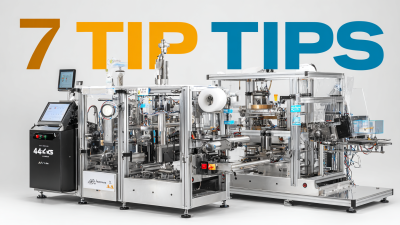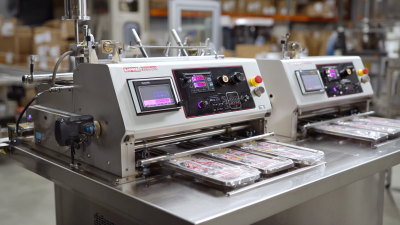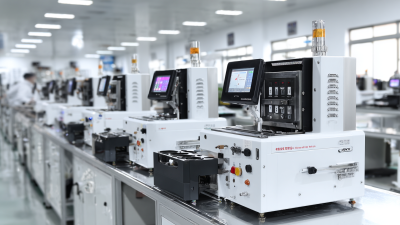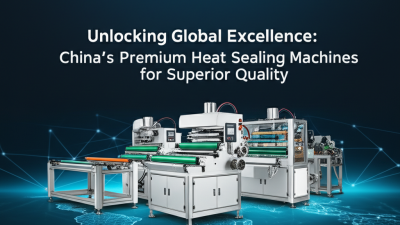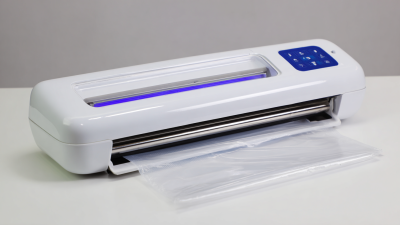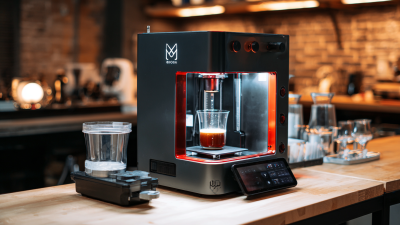Leave Your Message
In the ever-evolving landscape of global trade, the role of packaging solutions has become increasingly vital for ensuring product integrity, safety, and efficiency. One of the most significant advancements in this arena is the Heat Sealing Machine, which offers a myriad of benefits that cater to the demands of modern manufacturing and logistics. This innovative technology not only enhances the durability of packaging but also streamlines the sealing process, thereby reducing waste and operational costs. As businesses strive to meet both consumer expectations and environmental standards, the importance of adopting advanced packaging solutions cannot be overstated. This blog will explore the myriad advantages of Heat Sealing Machines, shedding light on how they are poised to revolutionize the future of packaging in the context of global trade.

In an era where environmental consciousness is paramount, innovations in heat sealing technology are paving the way for sustainable packaging solutions. As companies seek to align with stringent regulations and consumer preferences, heat sealing machines play a crucial role in enhancing the efficiency and sustainability of packaging processes. These machines ensure airtight seals that improve product shelf life while minimizing waste—a vital consideration for both manufacturers and the environment.
To further embrace sustainability in packaging, businesses can adopt a few tips. First, consider transitioning to recyclable or compostable materials that pair well with heat sealing technology. This not only reduces environmental impact but also meets the growing consumer demand for eco-friendly options. Additionally, optimizing heat sealing parameters can lead to a reduction in energy consumption and increased production efficiency, ultimately driving down costs and lessening the ecological footprint of packaging operations.
Moreover, collaboration with suppliers that prioritize sustainable practices can significantly enhance packaging sustainability. Engaging in partnerships that focus on renewable materials or innovative sealing technologies can enable brands to stay ahead in a competitive market while contributing positively to global environmental efforts. By investing in advanced heat sealing solutions, companies can make substantial strides toward achieving their sustainability goals and drive the future of packaging in global trade.
Emerging innovations in heat sealing technology are set to revolutionize packaging solutions for global trade. One noteworthy development is the introduction of advanced sealing systems that utilize sealing strips instead of traditional materials. This shift enhances the efficiency and sustainability of packaging processes, particularly in the food industry, where maintaining product freshness is paramount. The integration of smart machines in this arena not only streamlines operations but also reduces waste, ensuring that packaging aligns with modern sustainability goals.
To optimize your packaging operations, consider the following tips: First, invest in smart sealing devices that adapt to various materials and sealing conditions, improving versatility. Second, embrace IoT technology to monitor and control the sealing process remotely, enabling real-time data collection for better decision-making. Finally, prioritize training for your team to fully leverage these new technologies, ensuring that they can maximize the benefits of automation and intelligent systems in your packaging line.
By staying ahead of the curve with these innovations, businesses can enhance their competitive edge in a rapidly evolving market.
This chart illustrates the projected growth in investment towards innovative heat sealing machines over the next five years, focusing on key areas such as automation, energy efficiency, and smart technology integration.
The packaging industry is undergoing a significant transformation, driven largely by the integration of automation in heat sealing machines. With the demand for faster production times and greater precision on the rise, manufacturers are increasingly turning to automated solutions to streamline their packaging processes.
Automated heat sealing machines not only minimize human intervention but also enhance the consistency and quality of packaging, ultimately leading to reduced waste and lower operational costs.
Incorporating advanced technologies such as artificial intelligence and machine learning is further revolutionizing the efficiency of heat sealing operations. These smart systems can monitor and adjust sealing parameters in real-time, ensuring optimal performance and adaptability to various materials and product specifications. As a result, businesses involved in global trade can maintain competitive advantages by ensuring that their packaging processes are not only efficient but also scalable. The future of packaging lies in the seamless integration of automation, paving the way for innovative solutions that meet the evolving demands of the marketplace.
As global trade continues to expand, heat sealing machines play a crucial role in adapting packaging solutions to meet international standards. The increasing demand for sustainable practices has prompted innovations in this field, aligning with the broader trends toward environmental responsibility. With the urgent need to tackle climate change, manufacturers are focusing on developing heat sealing technologies that optimize material use and reduce waste, ensuring that packaging not only protects products but also supports sustainability goals.
Emerging trends highlight the integration of energy-efficient technologies in the design of heat sealing machines. By utilizing advanced materials and innovative production techniques, companies can enhance the performance and longevity of these machines while minimizing their carbon footprint. This shift not only caters to the regulatory demands of different countries but also positions businesses favorably in an increasingly eco-conscious market. As global standards evolve, the future of heat sealing promises to deliver not just efficiency and reliability, but also a commitment to sustainable development, ensuring that packaging solutions align with the urgent call for a greener economy.

As consumer expectations evolve, the demand for eco-friendly and convenient packaging solutions has become more pronounced. Today's shoppers are increasingly aware of the environmental impact of their choices, prompting companies to rethink their packaging strategies. Innovations in heat sealing technology play a pivotal role in meeting these expectations. By combining functionality with sustainability, brands can create packaging that not only protects products but also minimizes waste and reduces their carbon footprint.

One of the key design trends is the use of biodegradable and recyclable materials in packaging. Heat sealing machines have adapted to work efficiently with these new materials, ensuring a strong seal without compromising on environmental integrity. Moreover, convenience has never been more crucial—consumers appreciate packaging that is easy to open, resealable, or designed for portion control. This shift toward user-friendly designs is transforming the landscape of packaging solutions, as businesses strive to create products that resonate with the values of modern consumers. Through these innovations, companies can enhance their market appeal and contribute positively to global sustainability efforts.
